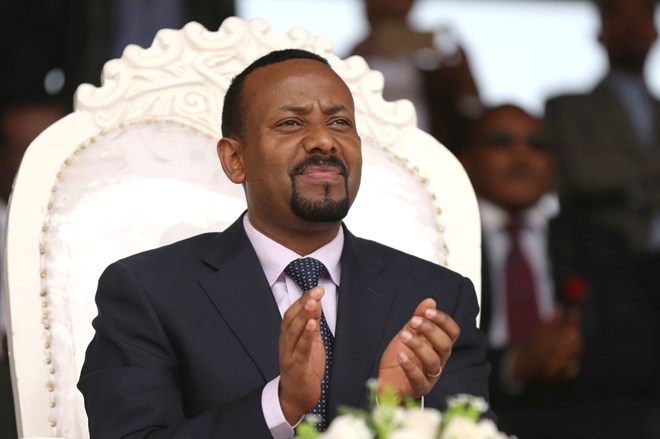Washington Post Editorial Board

Prime Minister Abiy Ahmed attends a rally during his visit to Ambo in the Oromiya region, Ethiopia, on April 11. (Tiksa Negeri/Reuters)
SIX MONTHS ago, Ethiopia appeared trapped in a cycle of unrest, repression and more unrest. Stability in East Africa’s largest country, with a population of more than 100 million, appeared to be crumbling, while the once-booming economy was facing a debt crisis. All of this was bad news for the United States, for which Ethiopia has been a key ally in combating terrorism in nearby Somalia. So it’s more than worth cheering the rush of developments in Addis Ababa during the past few weeks, which signal an astonishing turnaround under a new and dynamic young leader.
In the past week , the government of Abiy Ahmed has lifted a state of emergency, announced a major new program to partially or fully privatize state-run firms and said it would finally implement a peace agreement with neighboring Eritrea that it had been stalling for 18 years. That followed the release of political prisoners and invitations to exiled dissidents and media outlets to return home. Mr. Abiy, who took office on April 2, has been touring the country and promising even more change: He says the constitution will be amended to apply term limits to his position, which has been occupied by only two other men since 1995.
Fortunately, a majority in the ruling Ethiopian People’s Revolutionary Democratic Front, which has ruled the country autocratically for 27 years, concluded that change was necessary. Early this year, a notorious prison was closed and the first releases of political prisoners began; in February, Prime Minister Hailemariam Desalegn, who has been in office since 2012, was forced to submit his resignation. A few weeks later came the unexpected appointment of Mr. Abiy, who appears to have the backing of Oromo and Amhara factions within the ruling coalition. His first act was to deliver a powerful inaugural speech in which he apologized for the killing of demonstrators and welcomed dissent — a stance no Ethiopian government has adopted in modern times.
It remains to be seen whether Mr. Abiy can sustain his reform drive, which is sure to draw opposition from regime hard-liners. A key question will be whether economic reforms, including the sale of shares to foreign investors in large state companies and the privatization of others, will bring in enough hard currency to allow payments on foreign debts and ease import bottlenecks. A return of economic dynamism would go far to address the long-festering unrest; if that is accompanied by genuine political liberalization, the cause of democracy in Africa could get a historic boost.